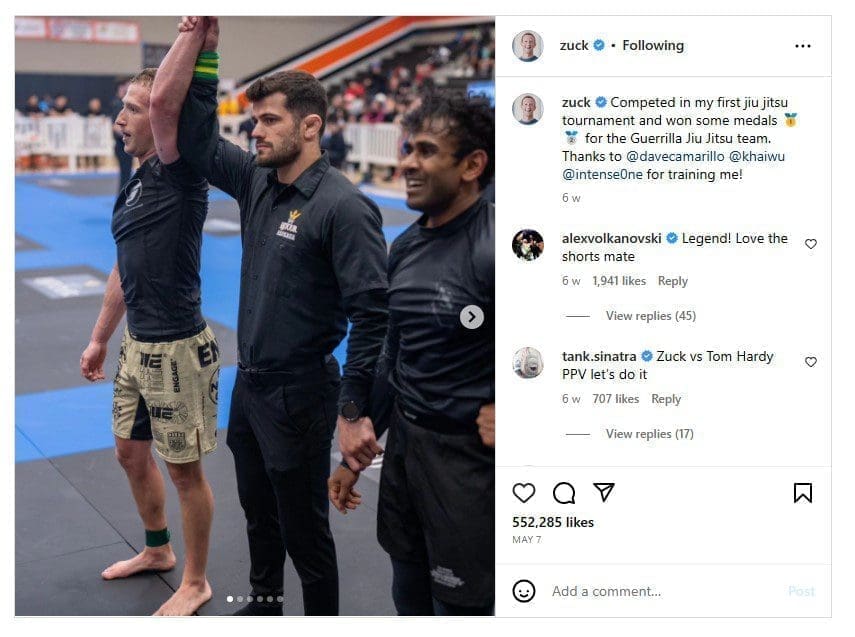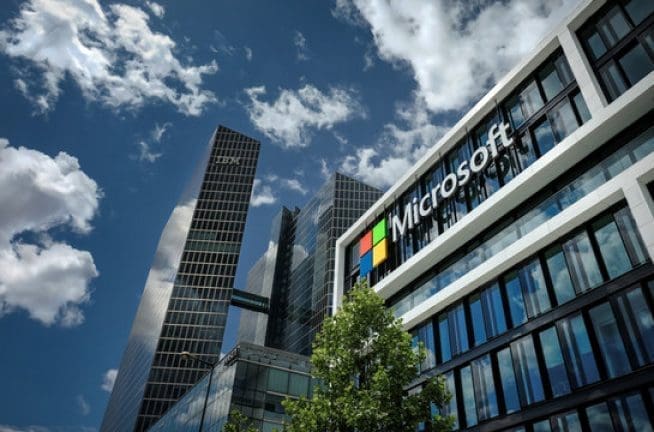Even by the standards of billionaire-versus-billionaire disputes, Elon Musk and Mark Zuckerberg’s proposed cage match stands out.

The two have provisionally agreed, via posts on their respective social media sites on Wednesday, to a duel after years of quiet tensions that have intensified since Musk’s purchase of Twitter late last year.
Since then, Zuckerberg has perceived an opportunity to attack Twitter, which has been plagued by controversy and missteps under its new owner. The most recent attempt involves having Meta Platforms create its own Twitter-like offering via Instagram.
Even if the two business tycoons never actually meet in the ring, the latest outburst between them—and the spectacle of will they or won’t they go through with it—highlights the intensifying competition between their business interests, injecting new vigor into the battle for social-media advertising dollars.
It is too early to say whether Meta versus Twitter will be comparable to the epic brand battles of the 20th century, such as Ford versus Chevrolet or Coca-Cola versus Pepsi. But it is evident that the masters are prepared for combat.
The two have had a simmering feud behind the scenes for years, occasionally taking public jabs at each other regarding AI and other topics.

According to those who have heard it, they have complained about each other in private: Musk, cash poor for years, lamented that Zuckerberg had made so much money so readily with software while he labored on electric cars and spacecraft. Meanwhile, Zuckerberg desired the respect for innovation that Musk received, according to these individuals.
This month, Meta executives introduced their upcoming Twitter competitor, internally nicknamed Project 92, to employees. According to The Wall Street Journal, Chief Product Officer Chris Cox suggested the product was inspired by users who desire “a sanely run” social media platform, a jab at Musk’s company.
Since assuming control of Twitter in late October, Musk has encountered a number of obstacles in his efforts to reshape the company to his satisfaction, including a decrease in advertising spending by brands who are, in part, concerned about the company’s instability. Musk responded by stating that drastic cost reductions, including workforce reductions, were necessary to avoid bankruptcy.
Now, he reports that the company is on course to be cash-flow positive and has hired a prominent TV advertising executive to serve as CEO in order to improve advertiser relations.
In response to news articles about Zuckerberg’s intentions to compete with Twitter, Musk has insulted him online. This week, a Twitter user cautioned Musk, pointing out that Zuckerberg has recently gained attention for his martial arts pursuits.
“I’m up for a cage match if he is lol,” Musk tweeted late Tuesday. Zuckerberg, who has been training in jujitsu, replied on Instagram the following day: “Send me location.”
Musk then tweeted, “If this is for real, I will do it.” He subsequently suggested they meet in Las Vegas for a match.
Musk tweeted throughout the evening about their prospective matchup, addressing the fact that Zuckerberg appears to be in peak physical condition. On Twitter, a photograph of Musk from last year depicting him out of shape and being hosed off shirtless resurfaced.

Musk tweeted, “I have this great move I call ‘The Walrus,’ in which I simply lie on top of my opponent and do nothing.”
This week’s proposed cage match harkened back to the early 1990s, when Herb Kelleher, co-founder of Southwest Airlines, resolved a business dispute by arm-wrestling a competitor in front of a Dallas arena audience in an event dubbed “Malice in Dallas.” Nevertheless, according to a chronicle of the event on Southwest’s website, the outcomes were predetermined.
In 2016, Musk’s rocket company SpaceX was contracted by Facebook to launch a satellite into space in order to provide internet access to large portions of sub-Saharan Africa. This was the first indication of the tech companies’ public animosity.
However, an explosion during a routine test launching on the ground destroyed the rocket and satellite, thwarting Zuckerberg’s plans.
“I’m deeply disappointed to hear that SpaceX’s launch failure destroyed our satellite, which would have provided connectivity to so many entrepreneurs and everyone else across the continent,” he wrote.
A year later, they were trading remarks regarding artificial intelligence, which Musk has warned could be hazardous to humanity.
During a Facebook live broadcast in his backyard while smoking meat, Zuckerberg was questioned about this position. “When it comes to AI, I’m particularly optimistic, and I believe that those who are pessimistic and…try to conjure up these apocalyptic scenarios…I just don’t comprehend it. “It’s extremely negative, and in some ways I believe it’s quite irresponsible,” he stated.
Musk responded with a tweet. “I spoke with Mark about this. “His comprehension of the topic is limited,” Musk said.
In 2018, amid Meta’s controversy over user-privacy concerns in the 2016 presidential election and a subsequent delete-Facebook movement, Musk tweeted about the subject. As CEO of Tesla and SpaceX, he deleted their Facebook profiles.
“Facebook gives me the willies,” Musk tweeted last year.
Their disagreement extends beyond each other. Both individuals have a history of engaging in heated exchanges with others.

Musk engages in numerous public disputes, using his Twitter account to mock fellow billionaires including Jeff Bezos, Bill Gates, and Warren Buffett. However, he has never suggested a fight with any of them. Last year, however, after the outbreak of war in Ukraine, he tweeted a challenge to “single combat” with Vladimir Putin, the president of Russia.
That battle never took place.
Meta Facebook’s chief executive officer, Mark Zuckerberg, was infamously embroiled in a private feud with Apple’s Tim Cook for years after Cook’s public remarks deemed by Facebook employees to be critical of the company. Since then, Facebook and Apple have been at odds over changes to privacy settings that hindered Facebook’s ability to monetize user data.
“We need to inflict pain,” Zuckerberg told his team in private as he attempted to rally them against Apple.
Musk, too, had issues with Apple’s iron grip on the App Store, which is crucial to Twitter’s ability to reach consumers. Soon after assuming control of Twitter, Musk declared war on Apple over the fees it charges for in-app purchases made through the App Store.
Cook appeared to diffuse the situation by inviting Musk to Apple’s headquarters and walking him around the company’s pond.
Social media was amused by the possibility of a conflict between social-media billionaires. One Twitter user suggested that podcaster and UFC analyst Joe Rogan serve as the referee. Musk responded with an image of a conflagration.
Both titans have interacted with Rogan in the past.

Last year, during a podcast appearance with Rogan, Zuckerberg discussed the similarities between business and mixed martial arts.
“Jujitsu and MMA, I believe, teach you about the flow and momentum of things, and I believe business is similar in this regard,” he said. “The most difficult aspect is recognizing when you are in a position where you must persevere.”
Recently, Zuckerberg boasted about his rigorous fitness regimen for Memorial Day and his first jujitsu tournament.
“I almost never exercise, unless you count picking up my children and tossing them in the air,” he tweeted on Wednesday.
Musk has a history of losing physical confrontations. Years ago, a match against a sumo wrestler left him with severe neck and back agony.
As the hype mounted, Musk’s mother, Maye, pleaded for calm.
“Not joking,” she tweeted on Thursday. “Fight only with words. While seated in armchairs. 4 feet apart. Whoever is the funniest triumphs.”

